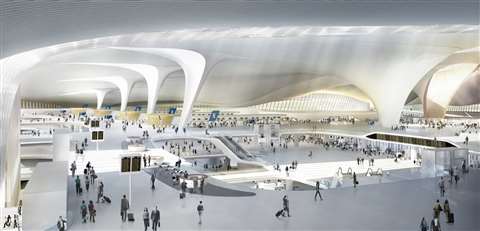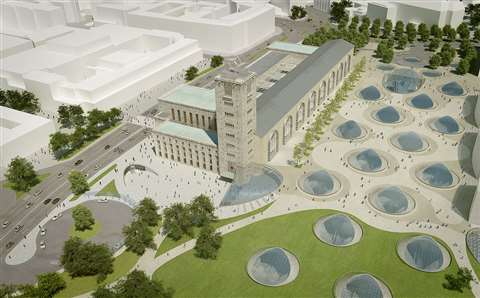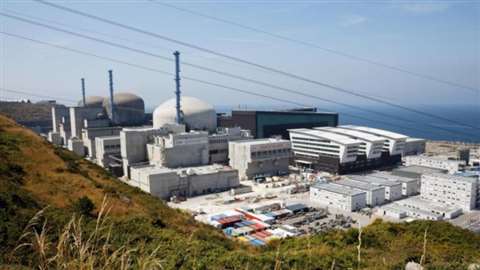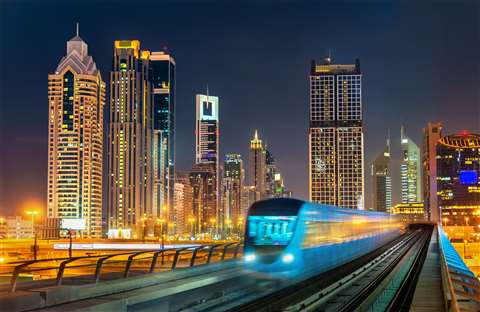Five overbudget megaprojects
16 March 2022
Financial constraints, governmental disagreements and the pandemic are just some factors responsible for the incompletion, and overspending, of some of the world’s megaprojects.
Navi Mumbai International Airport, India
Mumbai’s new international airport, designed by Zaha Hadid Architects, was first proposed in 1997 and was given approval in 2008. The airport is being developed through Public-Private Partnership.
 Navi Mumbai International Airport has faced numerous delays (Photo: Zahad Architects)
Navi Mumbai International Airport has faced numerous delays (Photo: Zahad Architects)
The project has faced multiple delays mainly due to disagreements between government departments over the location and ecological impact, as well as protests from local villagers.
Foundations were finally laid in February 2018 but meant that the phase one completion date of April 2019 could not be met.
The state had hoped that the airport would be ready by mid-2020, but the construction of the runway was still incomplete by the end of 2019 due to people living nearby refusing to relocate.
Additional financial issues also impacted the project and saw it go from the original budget of US$670 million to more than tripling to US$2.2 billion.
The most recent timeframe suggests that the airport should be fully operational by 2024, almost three decades after it was first proposed.
Stuttgart 21 rail project, Germany
The Stuttgart 21 project in southern Germany, built to enhance the region’s railway system, was officially announced in 1994 with an estimated cost of US$3.3 billion.
 Stuttgart main station (Photo: Aldinger and Wolf)
Stuttgart main station (Photo: Aldinger and Wolf)
Construction of the project, designed by Ingenhoven architects, didn’t start until 2010 – this was largely due to unexpected increases in construction expenses and environmental regulations.
The transformation of the current overground train station into an underground public transport hub is still incomplete. The rail company, Deutsche Bahn, approved a financing framework of US$9.3 billion for the project in January 2018, leaving it US$6.5 billion over its original budget.
The pandemic also meant the project faced severe disruptions as workers had to isolate themselves. The start of operation is now estimated for late 2025 and will be six years late with an overspend of US$6.5 billion.
Flamanville 3 nuclear reactor, France
The construction of a new reactor at the Flamanville Nuclear Power Plant in northern France began back in December 2007. The project was initially budgeted at US$4.9 billion by operators EDF and it was estimated that it would take 54 months to complete.
 Work is still ongoing in Flamanville, France (Photo: EDF)
Work is still ongoing in Flamanville, France (Photo: EDF)
The project faced numerous issues, such as safety and equipment issues, that delayed operations until 2012. A significant issue that has caused delays is reportedly a break in the main secondary system penetration welds.
Due to these delays, the loading of fuel into the reactor was postponed.
According to Montel Group, the commercial start-up of the reactor is now expected at the end of 2023. This timeframe should allow EDF to fix any immediate problems, including 110 faulty welds and corroded safety valves, and complete the project 11 years after it was expected.
The reactor is now expected to cost the France-based energy firm US$15 billion, an additional spend of US$11 billion.
California High-Speed Rail, USA
California’s plan to connect the state’s largest cities, from San Francisco to San Diego, via a high-speed train line has hit numerous issues along the way.
 The new rail link will go from Los Angeles to San Francisco in under five hours (Photo: Adobe Stock)
The new rail link will go from Los Angeles to San Francisco in under five hours (Photo: Adobe Stock)
Construction was approved in a referendum in 2008, where voters approved a US$9.9 billion budget to begin construction of the 800 mile rail link. The project was estimated to cost US$40 billion and promised commuters a two hour and 40 minute journey between Los Angeles and San Francisco.
The megaproject has been delayed by protests, lawsuits and replanning with the construction of one segment of the line falling three years behind schedule.
According to data from ConstructionDive, the project’s budget was recently increased by an extra US$5 billion to distance the train from the Cesar E. Chavez National Monument in the Central Valley and to tunnel new tracks near Burbank airport.
The total cost of the project has since risen to US$105 billion, US$65 billion higher than its original 2008 estimate.
The rail authority has said that by the middle of this year, around 422 miles should be environmentally cleared, with the expectation that the last two sections of the project will commence construction in 2023.
Phase one of the rail megaproject is currently due to open in 2033.
Gulf Railway Line, Persian Gulf Countries
Once complete, the Gulf Railway Line will connect the six Gulf Corporation Council (GCC) member states: the UAE, Saudi Arabia, Oman, Qatar, Kuwait, and Bahrain.
 Despite the uncertainty on the stage of this project, other rail link projects are going ahead, such as Etihad Rail (Photo: Adobe Stock)
Despite the uncertainty on the stage of this project, other rail link projects are going ahead, such as Etihad Rail (Photo: Adobe Stock)
The total length of the track will extend 1,353 miles, with each state organising the construction of the project within its own territory. Plans for construction were originally approved back in 2009 and original estimates suggested the line would cost around US$14 billion and be complete by 2017/18.
During works, the cost of the megaproject has reportedly gone from US$14 billion to almost US$25 billion, according to an article in Railway Technology.
The project has met a number of challenges including the financing of the project exacerbated by low oil prices, and lack of alignment in interests of the six states involved.
Construction work has still not started on the project.
STAY CONNECTED



Receive the information you need when you need it through our world-leading magazines, newsletters and daily briefings.
CONNECT WITH THE TEAM











